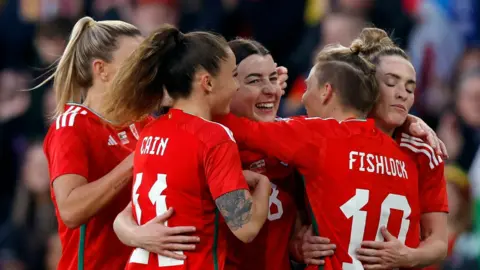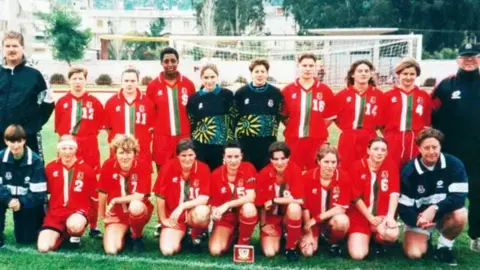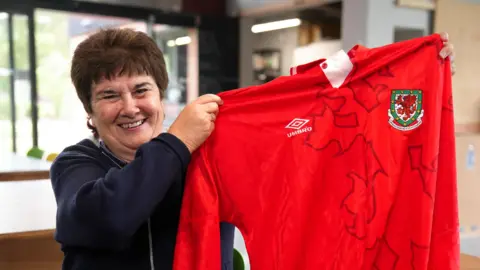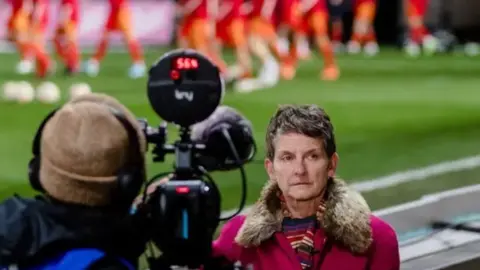Wales women's football - a 50-year ban to Euro 2025
 Reuters
ReutersWales are days away from playing at their first major tournament - the Women's Euro 2025.
Thousands of fans have flown out to Switzerland to rally around them as they play their opening game against the Netherlands on Saturday.
But their road to success is perhaps even more impressive when you widen the lens and look back at the women whose shoulders the players stand upon, and what they went through to get there.
Women's football in Wales dates to the late 19th Century before momentum picked up during World War One - but an almost 50-year ban followed, relegating its players to the sidelines.
Formed in 1895, the touring British Ladies Football Club first made its mark in Wales as one of the earliest women's teams in the world.
Based in London, they visited Wales several times, drawing in large crowds and interest in the sport.
Enthusiasm grew during the World War One as women stepped into jobs typically carried out by men and began forming football teams to compete against one another.
Several matches, often staged to raise money for the war effort, were played at Wrexham's Racecourse Ground.
One of the most notable matches was that of the munition factory team Dick, Kerr Ladies FC from Preston, who brought in a crowd of 53,000 to Everton's Goodison Park on Boxing Day in 1920.
 FAW
FAWMomentum soon halted in 1922 when the Football Association of Wales (FAW) imposed a ban on women's football, prohibiting matches from being played at any FAW-affiliated grounds.
It followed the lead of the English Football Association, which claimed the game was "quite unsuitable for females and ought not to be encouraged".
But some have suspected the reason to be discomfort among the male administrators at how quickly the sport was gaining popularity.
Women's football was pushed to the sidelines for decades, with the ban remaining in place in Wales until 1970.
Wales' very first game at association level was not until 1973, against Ireland.
Former player Michele Adams was just 15 when she made her debut at the match, and recalled the team borrowing a kit from the Swansea men's team.
"They used to play in red in those days," she said.
"It was absolutely pelting it down... as the pitch got heavier and the rain came down, the kit just grew on us."
Michele recalled having their own kit by the next game against England, which they received sponsorship for.
"Travel was adhoc, we spent three days on a bus to Italy for one match," she said.
"It was the enthusiasm of the coach and the manager at the time which determined how well we did."
Michele went on to play for Wales for 23 years and earned 28 caps.
She was involved in lobbying for recognition of the women's game in Wales alongside fellow former internationals Karen Jones and Laura McAllister, which led to the first official Wales women's team affiliated with the FAW being introduced in 1993.
Their first qualifying match against Switzerland for Euro 1995 was played at Cwmbran Stadium, and attracted a crowd of just 345.

Former Wales international Kathryn Morgan, 49, said she was rejected from every boys club in Merthyr and the very first time she played an 11-a-side game was at the age of 17.
She was chosen to play for Wales at the age of 18, something she said she was beyond proud of, but looking back described it as "completely amateur".
"We had the minimum. At the start you don't really care about that, but we dealt with everything else."
"You tell your parents I will be rich and famous, I will buy you a mansion. They are still in the same terraced house, still waiting," she laughed.
Morgan said as time went on the team started comparing their investment to other national teams like Scotland, who despite being the same size had more funding.
"We started pestering the FAW, asking questions, why can't we have that... but we were swiftly told that you need to be grateful and there is no room, really, for giving your opinion."
"Some people unfortunately lost their place in the national team because of that," Morgan added.
"I felt that at that time, if they only invested in the players they had, we would now be 10 years on than where we are now.
"The more investment we've had, the reality is that is what gets us over the line. Investment creates success, and that's a story in itself."
 FAW
FAWFormer Wales captain Laura McAllister has been a driving force in helping shape women's football in Wales.
In 2023 she made history as the first Welsh person elected to the Uefa executive committee and subsequently became the first and only female vice-president.
Despite her success, she recalled her interest in football being seen as unusual growing up as "you were regarded as an anomaly in the 80s and 90s".
"Like lots of girls in my generation, you were seen as an oddity," she said.
There were no female footballers in the limelight when she was growing up, McAllister added, so all of her idols were Cardiff city players on the men's team.
"I was part of a football family, my grandfather was a Cardiff City fan, so it was normal to me, I remember going to games as just a toddler."
Growing up in Bridgend, McAllister said she played football with boys as she was a good player, but she believes it wouldn't have been the case for those who weren't considered good enough.
At the age of 12 she stopped playing formally as there just weren't clubs for girls, an issue which she says persists today.
While women's football is a much different picture today, McAllister believes women are still playing catch up for the ban imposed over a century ago.
"No-one could be happier than me to see Wales on the global stage, but let's not think battles are over, there is more work to do.
"Qualification doesn't fix the nationwide deficit," she said. "It doesn't make up for the lack of investment and abandonment."
Wales are the lowest ranked team in the Women's Euro 2025, but McAllister says women's football would be a very different place if the ban was never enforced.
"You just have to look at Scandinavian countries and their success, where they have embraced women players as the norm.
"No cultural differences, no cultural rejection or opposition to them playing.
"Women still don't have equality in the game. The sign of success will be when an average girl or woman can have access to grassroots football like the average boy or man.
"We have just as much to give as men."
There is no taking away from the magnitude of Wales' historic Euro 2025 qualification.
But to solidify equality in women's football over the next 50 years, it seems there is plenty more to be done.
